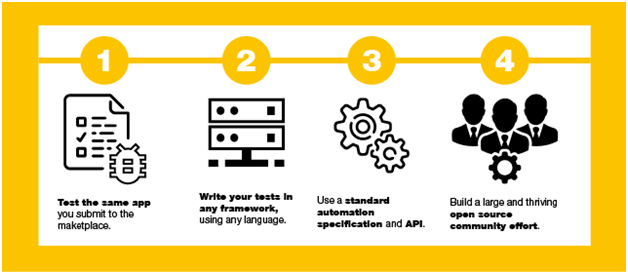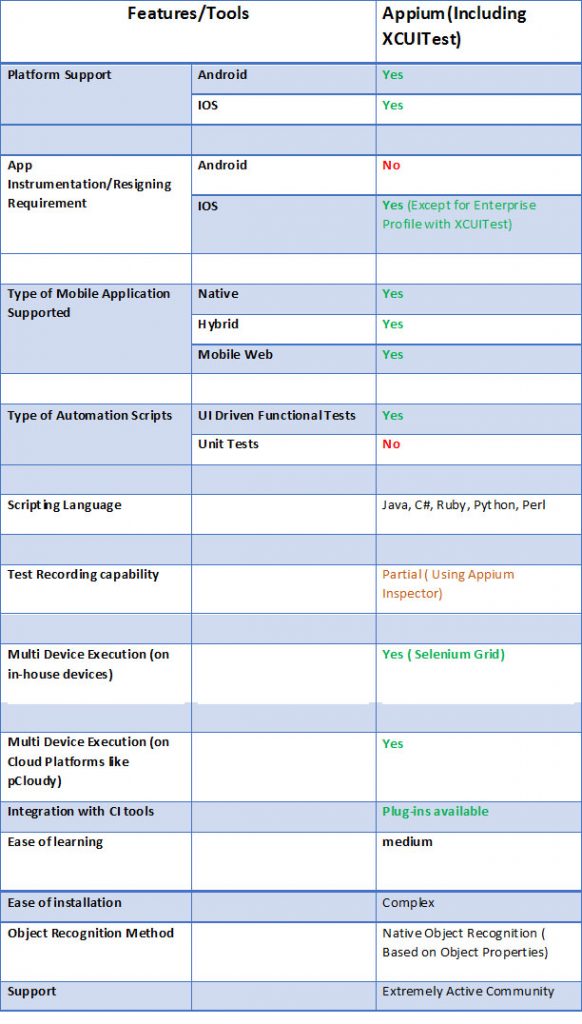Why Appium is The Best?
With Appium creating a buzz in enterprise mobility, mobility teams are still finding ways to successfully automate tests leveraging Appium. Appium being an open source tool is the perfect choice for automating native, mobile web and hybrid applications on their respective platforms.
Let us now see the major factors behind Appium being the best choice for mobile automation tool:

1. Use of standard API: Appium is widely popular because modification of codes or a recompilation of your app is not required as it uses the standard API in all the platforms. Appium makes it effortless to create your tests against iOS and Android platforms with same API. But, separate iOS and Android scripts are still needed as the UI elements vary on both the platforms.
2. Use any WebDriver compatible language: Appium gives the freedom from getting locked into a particular language or framework to write and run the tests. Any WebDriver compatible language like Perl with Selenium WebDriver API, Java, PHP, C#, Python, Ruby, Javascript with Node.js can be used for writing the tests.
3. Testing Framework of Choice: Appium gives flexibility to mobility teams to use testing framework of their choice. Earlier, tests could only be written through Javascript using the UI Automation of library for Apple or Java based tests could only be written through UI Automator of Google. Appium completely changed this scenario.
4. Cross-platform test automation: Having the capabilities to test on both Android and iOS devices makes it the best cross-platform mobile app test automation tool. In order to interact with Android and iOS with Selenium WebDriver, Appium uses the JSON wire protocol. Appium makes use of the libraries provided by Apple with the help of an application called Instruments to automate iOS apps. In newer versions of iOS after v9.3, the Instruments api has been deprecated and now use XCUITest framework.
The method is similar in Android also where Appium proxies the automation command to the UIAutomator test case running on the device. Android has a native UI automation framework called UIAutomator which supports running JUnit test cases from the command line directly into the device.
5. Open Source: Being an open source testing framework is one of the biggest advantages of Appium as it supports Simulators, Emulators, real devices, and of course, native, hybrid and web application testing of iOS and Android. Appium having a large and thriving open community makes it easier for new automation engineers to clarify their doubts.
You can instigate test scripts created from Appium libraries locally, on a session reserved by the Cloud, for any iOS or Android device. Appium integrates with continuous integration servers to ensure better results and drives GUI-related widgets and controls, allowing the same scripts to run for different software versions of various apps. Appium can automate native, web and hybrid mobile apps, and you can test on a real device, a simulator, or an emulator. It also supports Safari on iOS and Chrome Mozilla or any built-in ‘Browser’ app on Android.
There are many automation tools for mobile application testing. Testers usually choose Appium as the best mobile testing tool. Mobile automation testing tools comparison can be done on the basis of language support and continuous integration. The most common automation testing tools used for mobile application testing are Appium, Robotium, and Calabash. If you are looking for iOS app automation testing tools then Appium and Calabash can do the job for you.
Here is tabular representation for you to understand Appium’s compatibility with different features and tools.

Why mobile device cloud with built-in Appium support?
Teams who are getting started with Automation or are considering Appium as an option, must explore an alternative to go for a mobile device cloud with built-in Appium.
A mobile device cloud not only assists in managing and sharing devices, but also helps in streamlining automated testing and continuous delivery processes. A mobile device cloud with built-in Appium makes it easy for teams to get started with automation and scale up later. Furthermore, it will give additional cushion against any sort of roadblock that might occur while using an open-source platform for tests. Let’s have a look at some of the benefits of having a built-in Appium support on a mobile device cloud:
- Supports parallel testing on multiple devices
- Reduces the complexity of test frameworks
- Creation of appium scripts become easy
- Streamlines the CI/CD process
At pCloudy, we are dedicated towards helping enterprise mobility teams make the process of mobile development, testing and device sharing seamless and faster by integrating it with cutting edge tools like Appium. Read this blog to get a comprehensive analysis sheet to quickly choose which open-source test automation tool will be right for your automation testing.
Sign up on pCloudy and automate your tests using best open source automation tool for faster and better delivery of apps.
For more information check out this video:





 September 30, 2024
September 30, 2024
 September 13, 2023
September 13, 2023






